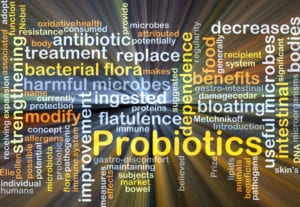Written by Greg Arnold, DC, CSCS. Two weeks of intervention with Lactobacillus rhamnosus GG (LGG®) and Bifidobacterium (BB-12®) significantly reduced H. pylori infection and symptoms in the participating subjects compared to placebo.
 Helicobacter pylori, a bacterium responsible for stomach (peptic) ulcers, causes an estimated one million hospitalizations and 6,500 deaths annually in the United States. These hospitalizations and deaths have imposed a $6 billion yearly price tag on our healthcare system, with a breakdown of $3 billion in hospitalization costs, $2 billion in doctor’s office visits, and $1 billion in decrease productivity and lost workdays 1.
Helicobacter pylori, a bacterium responsible for stomach (peptic) ulcers, causes an estimated one million hospitalizations and 6,500 deaths annually in the United States. These hospitalizations and deaths have imposed a $6 billion yearly price tag on our healthcare system, with a breakdown of $3 billion in hospitalization costs, $2 billion in doctor’s office visits, and $1 billion in decrease productivity and lost workdays 1.
Eradicating H. pylori can be extensive and usually requires a “triple therapy” approach utilizing three different antibiotics. However, research has shown a decreasing benefit to this therapy and suggests only a 70% success rate 2; therefore, other options are being sought to eradicate H. pylori3.
In a 2015 study 2650 subjects (282 men, 368 women) aged 39 to 65 and with a confirmed H. pylori infection based on previous research 4, were given a 14- day treatment with either a probiotic supplement (n=333) or a placebo (n=317) to be taken twice daily and at least 2 hours prior to or following their daily antibody therapy. Before and after the two-week intervention, each subject completed a questionnaire assessing the severity of the 10 symptoms often experienced during triple therapy treatment and were tested for the presence of H. pylori.
The Probiotic preparation contained Lactobacillus rhamnosus GG (LGG®) and Bifidobacterium (BB-12®) in the concentration of 108 to 1010 living bacteria capable of reproduction per capsule and was to be taken twice daily, either two hours before or after daily antibiotic therapy. These probiotics have been shown to be effective in treating a number of digestive illnesses, from ‘‘traveler’s diarrhea”5 to gastroenteritis in both children 6and adults 7.
- The researchers noted that the probiotic group had a statistically significant reduction in H. pylori infection (87.38% eradication versus 72.55% in the placebo group,
- p < 0.001) as well as a significant improvement in symptoms frequently experienced with triple therapy, including:
- Flatulence (affecting 27% of probiotic subjects versus 39.6% of placebo subjects, p < 0.001)
- Nausea (affecting 30.6165% of probiotic subjects versus 51.5% of placebo subjects, p < 0.001)
- Heartburn (affecting 55.7% of probiotic subjects versus 69.7% of placebo subjects, p < 0.001)
- Diarrhea (affecting 3.9% of probiotic subjects versus 15% of placebo subjects, p < 0.001)
For the researchers, “Adding probiotics to the standard triple therapy for H. pylori eradication significantly contributes to treatment efficacy and distinctly decreases the adverse effects of therapy and the symptoms of the underlying disease.”
Source: Hauser, Goran, Nermin Salkic, Karina Vukelic, Alenka JajacKnez, and Davor Stimac. “Probiotics for standard triple Helicobacter pylori eradication: a randomized, double-blind, placebo-controlled trial.” Medicine 94, no. 17 (2015).
© 2015 Wolters Kluwer Health, Inc. All rights reserved.
Posted October 17, 2017.
References:
- CDC. Helicobacter pylori and Peptic Ulcer Disease. 1998; Helicobacter pylori and Peptic Ulcer Disease pylori infection” posted on the CDC website – https://www.cdc.gov/ulcer/economic.htm – Available at: https://www.cdc.gov/ulcer/economic.htm – Accessed October 14, 2017.
- Hauser G, Salkic N, Vukelic K, JajacKnez A, Stimac D. Probiotics for standard triple Helicobacter pylori eradication: a randomized, double-blind, placebo-controlled trial. Medicine. 2015;94(17).
- Malfertheiner P, Megraud F, O’morain CA, et al. Management of Helicobacter pylori infection—the Maastricht IV/Florence consensus report. Gut. 2012;61(5):646-664.
- Tonkic A, Tonkic M, Lehours P, Mégraud F. Epidemiology and diagnosis of Helicobacter pylori infection. Helicobacter. 2012;17(s1):1-8.
- Oksanen PJ, Salminen S, Saxelin M, et al. Prevention of travellers diarrhoea by Lactobacillus GG. Annals of medicine. 1990;22(1):53-56.
- Guandalini S, Pensabene L, Zikri MA, et al. Lactobacillus GG administered in oral rehydration solution to children with acute diarrhea: a multicenter European trial. Journal of pediatric gastroenterology and nutrition. 2000;30(1):54-60.
- Buydens P, Debeuckelaere S. Efficacy of SF 68 in the treatment of acute diarrhea a placebo-controlled trial. Scandinavian journal of gastroenterology. 1996;31(9):887-891.
